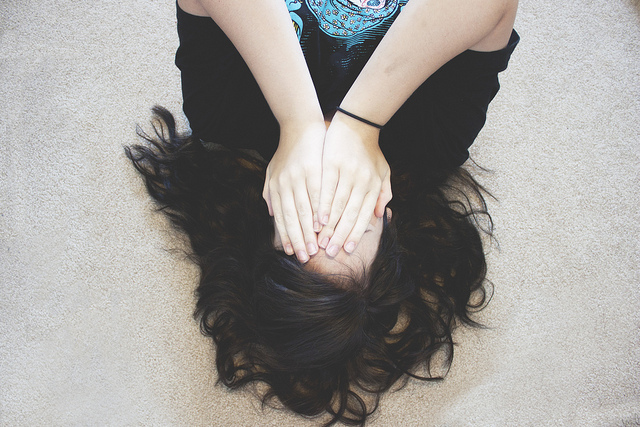
June 2, 2016 was #WorldEatingDisordersDay. Search it on Facebook and you’ll see that thousands of people were talking about it.
No doubt it’s a conversation worth having—not only to promote the awareness of such diseases, but to make strides in removing the stigma that surrounds them, trailing in the lurks of an already difficult experience for those suffering.
On awareness days like these, all it takes is logging on to your social media accounts to find endless posts relating to body image, shedding light on the fact that our perceptions of physical ideals are often unattainable and that we should love ourselves exactly as we are. There’s certainly no shortage of opportunities to find self-love and body positive movements circulating the internet and beyond these days.
Let me be clear: This is a huge step and a wonderful, beautiful thing.
That being said, it’s easy from the outside looking in to think that eating disorders only develop out of one’s dislike for one’s body, thus pinning both the cause and effect of disordered eating to a purely physical plane.
While this certainly is a real and prominent facet of the diseases included under this umbrella, it’s definitely not the only one; however, I hardly hear anyone mention the underlying factors that, in my experiences, were infinitely stronger than an outright physical obsession with appearance.
What I’m talking about is the psychological component of disordered eating, the piece of the puzzle that determines how those affected cope with and handle their experiences—in this case, through their relationship with food.
Sure, I’m aware that plenty of sufferers (of anorexia, for example) are fueled by the intention to adapt to whatever beauty standards they feel most compelled to fit. Of course, this intention easily spins out of control, creating an addiction to the idea of thinness—although, not surprisingly, the sufferers soon find that they are never thin enough.
By the same token, many sufferers develop this disordered relationship with food as a means of acquiring a voice. At least, this is how I view the disease based on my own experiences and those with whom I’ve exchanged stories.
I was in high school when I first “toyed around” with eating (or not eating). I learned about eating disorders in health class, and as screwy as it seems, that’s what planted the seed in my mind that I’d “give this a try.” As a ballet dancer, it was too easy to place the blame on my training and career goals: I had to be thin. I had to be tiny. I had to be light.
But in retrospect, that was never the issue. I know this now, having emerged after years of struggling with periods of relapse and recently doing the work that comes with asking “why” again and again and again.
I understand now that right at the onset of my illness, I felt unheard. Unsupported. Ignored for my true wants and needs. Ashamed for trying to express myself. Guilty for having a self-centered and time-consuming dream. Suppressed for the sake of keeping others safe and making their lives easier.
While I don’t remember much about that time in my life, I do remember this: It was clear to me that I could not be accepted as I was, that I was a bit too much, that my voice would be better if silenced and so I would be better if I hardly existed.
And so I shrunk. I was not at all me inside. I made every effort to starve that person who was not accepted, not supported, not celebrated. That effort manifested physically in disordered eating, wavering between starvation and, when forced to eat, purging.
This marked my entrance into silence, but make no mistake: my disordered eating was without a doubt a piercing cry for help. While my actions came from a place of trying not to be heard, deep down, it was all I wanted—for someone to hear me. I needed someone to hear me. And so food became my voice, my desperate attempt for someone to care when I didn’t feel worthy of asking with words.
But that’s what people don’t talk about on social media: the fact that disordered eating (and perhaps many—if not all—addictions, as I’ve always felt that the emotions tangled up in these diseases most strongly resemble those of addiction) can certainly be as “simple” as wanting to be thinner due to societal pressures (I use quotes because believe me, it’s never truly simple, and I have no intention of invalidating that cause by saying so), but that more often than not, this mode of self-harm comes from some other area that’s lacking. It’s a literal manifestation of not feeling capable or worthy of self-nourishment, and that applies to the entire spectrum of eating disorders.
It’s easiest to group disordered eating into causes such as “she just wants to be skinny like the models on magazine covers, that’s why she doesn’t eat” or “he just has no self-control around food, that’s why he binges.” It’s easiest to cite appearance-based motives when discussing these diseases because in reality, they’re much more complicated to explain from the perspective of those suffering; in fact, if you asked me when I was going through the worst of it, I would have either denied I had a problem or simply stated that I needed to keep myself thin.
It was simply easier that way.
It’s only now that I can look at the situation from a distance and understand that this physical desire made up only a small fraction of the illness itself. The pain I experienced internally from feeling unheard, unaccepted, guilty and ashamed was what prompted my need to disappear, and because addictions tend to show a direct link between the mind and the body (as does everything, though the majority of western culture has yet to fully appreciate such an undeniable connection), my need to disappear was reflected in the most logical way: I strived to fulfill that need externally with the hope that it would work from the outside in—that if I could shrink to nothing in the physical realm, then this would satisfy my need to shrink in the mental and emotional realm as a result.
And wouldn’t you know… it worked.
But of course, it only worked until it didn’t. Until I nearly imploded. Until I became so wrapped up in the illness that dying seemed to be the best option. Until things kept falling apart in ways I couldn’t yet piece together, though I can now.
And now, I’m using the voice I’ve reclaimed in order to shed light on this “other side” of disordered eating: the psychological side that prompts such a devastating plunge into an illness that’s most frequently associated only with the desire to be thin because it’s what pop culture has dubbed most beautiful.
Don’t get me wrong, that certainly doesn’t help the cause of fighting eating disorders among the masses. As long as the pressures of our culture continue to infiltrate our daily lives—which they will—there will always be an issue.
However, it’s important that when we discuss the matter in our efforts to spread awareness, we bring up the psychological components that go beyond wanting to look a certain way—things like self-worth and how its disintegration for any number of reasons (e.g. abuse, abandonment, trauma, manipulation) can create the launching pad for disordered eating, or how certain populations (like women, for example, though both sexes and all gender identifications are without a doubt susceptible to suffering from disordered eating) are likely to develop these diseases due to the societal or personal structures placed upon them, like in my case how I felt unheard and that my voice was not allowed its truest expression.
When talking about awareness, we need to talk about that stuff, too.
Why? Because how can we expect people with these diseases who don’t necessarily identify with body image issues to reach out for help when that’s all they see on the subject? And if they won’t reach out, how can we help them?
And if we can’t help them, then what exactly are we doing by spreading awareness? If we’re not helping others identify the full range of potential causes of these diseases, how will they know to help someone they love when something just doesn’t seem right?
It all comes down to the intention behind these hash-tagged awareness days. What we’re trying to do—or at least what I hope we’re trying to do—is reach people with our message not only so that they themselves can get help if they need it, but so that those who know someone who needs help can recognize the illness and hopefully offer compassion enough to either directly or indirectly get those suffering into the care of someone who can help.
That doesn’t work if we disregard an entire portion of the causes that so often result in disordered eating.
Every pairing of cause and effect matters when addressing diseases that result in addictive behaviors. They’re multidimensional illnesses with roots in various aspects of the psyche; while those pieces may align to manifest in drug or alcohol addictions for some, in those with eating disorders, they manifest in a dangerous relationship with food to express whatever emotion or experience is causing pain.
So yes, body image issues are important and we should absolutely continue to have that conversation. But it’s not the only conversation we should be having when discussing eating disorders.
If we want to bring about awareness in the most helpful way, we have to be mindful of every potential cause and effect. We have to understand that it’s complicated. We have to understand that it’s not easy to talk about.
And that’s exactly why we have to talk about it.
Author: Sara Rodriguez
Editor: Catherine Monkman
Photo: Megan Leetz / flickr








Read 4 comments and reply